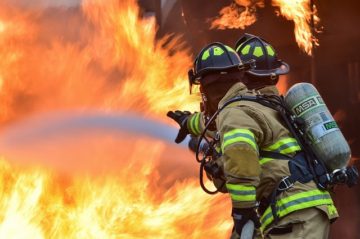An excerpt from my next book!

I’m writing another book, this one dealing with a structured approach to preparedness and personal security. It’s a different approach to the topic, and I think it will be tremendously useful to help you achieve a balanced approach to your safety. It integrates self defense, medical response, and disaster preparedness into a cohesive and manageable whole. If you’ve ever been a little overwhelmed by how big the world of self-reliance is, this book will help you make sense of it all.
In this chapter I talk about practice in the global sense, and why it’s important.
The fire drill lesson
I don’t know how things are in schools these days, but when I was a kid we had regular fire drills. We were taught what to do and where to go in the event of a fire, and every so often we’d practice those procedures to make sure we could get out of the building as quickly and orderly as we could. In addition, the Principal would occasionally sound the fire sirens unexpectedly so that we could experience the sudden need to evacuate the building under somewhat realistic conditions.
(One time I happened to be standing directly under one of the sirens when it went off. I can still recall the exact pitch and volume, and my ears rang for a couple of days after!)
There is a direct corollary to your home life: your family, too, needs to have a fire evacuation plan. Each member needs to know exactly where to go and what to do in the case of a fire, and your family needs to occasionally have a fire drill to practice those skills. Of all the people I’ve talked to about this subject, I’ve found only a couple who actually had a fire evacuation plan for their home and practiced it. Should it surprise you that they were both teachers?
Beyond the fire
Fire drills aren’t just for fires, however. Drills and tests need to be a part of your planning from the beginning; you need to practice using your Equipment and the skills you gained in your Training if you’re to be sure your plans will actually work.
Practice takes many forms. When we’re talking about defensive shooting, practice means getting out to the range and doing exercises that duplicate what you learned in your shooting courses. Doing them again, looking for errors and correcting them, helps you maintain your shooting skills.
You can also practice your medical skills be having someone pretend to be injured and then apply the proper treatment. Having a practice tourniquet you can use again and again in these exercises is important, and being able to apply that tourniquet quickly in a stressful situation is an important part of the skill.
While we’re talking about trauma medicine, it’s important to practice self-care as well. You never know when you might be in an accident — or worse, attacked with a knife or gun — and need to save your own life. Can you apply a tourniquet to yourself using only one hand? How about that pressure dressing?
Practice involves exercising your gear, too. If your disaster plans include a generator (and they should), periodically starting and running that generator to power the same appliances it will in a real emergency is important. Not only does it verify that the generator is still working, it also verifies that you remember how to use it safely. Generators produce huge amounts of power, and since that power is often needed in wet and windy conditions electrocution is a real hazard. Practicing how to set up and use the generator without electrocuting yourself is an important skill to practice!
Many people have “bug out bags” or “get home bags” which they plan to use to sustain themselves in the case of a widespread disaster. If you have one, have you ever really practiced with it? Set up a weekend where you simulate the need to walk away from your house or vehicle. Cut the power in your home or walk out into your yard and stay there for the weekend, subsisting only on what’s in your packed bag. I’ll bet you find some significant flaws with what you’re carrying, your ability to carry it, or your skills.
I can’t over-emphasize the need for practice and testing your preparedness plans. Build practice and testing exercises into your planning from the start.
My new book will be out sometime in June. Stay tuned!
– Grant
P.S.: Just because I’m writing a new book doesn’t mean my last one is gone! You can still get a copy of Protect Yourself With Your Snubnose Revolver in paperback, Kindle, and iBooks formats!
Listen to this blog – and subscribe to it on iTunes by clicking this link!
- Posted by Grant Cunningham
- On April 28, 2017

